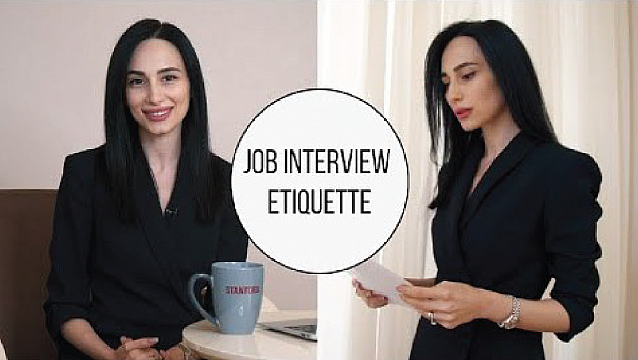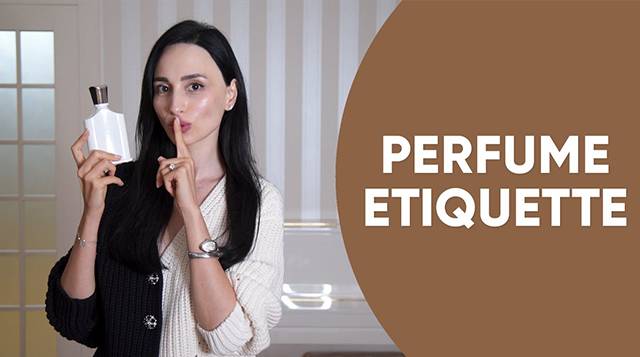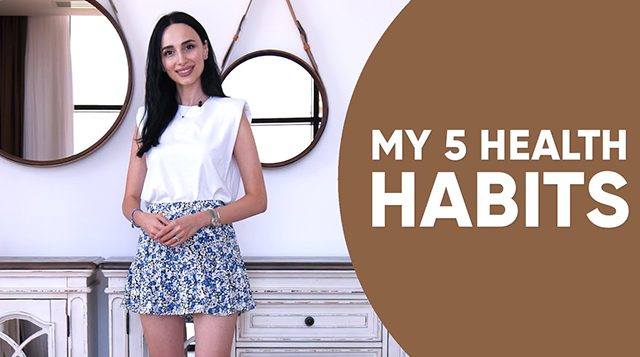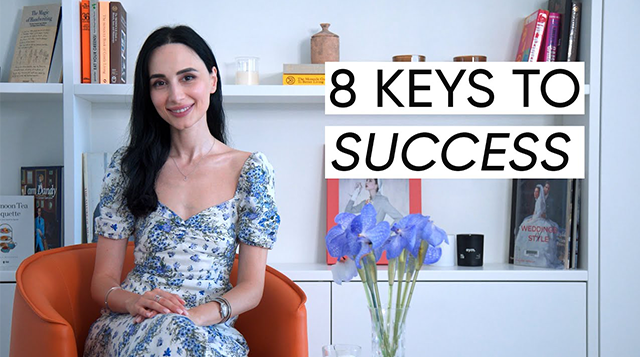
What is a job interview?
A job interview is the final stage of a recruitment process in which interviewers, or corporate representatives, ask potential candidates various types of questions to determine which of the candidates who sounded wonderful on paper also sounds good in person.
The term interview implies a question and answer session between a company representative/panel of company representatives and the job seeker. This is a crucial moment, a life-changing moment because the outcome of the interview will determine whether or not the job applicant gets hired. Depending on the competition for the position, there may be one or several interviews. As a result, it is critical that you are well-prepared for each and every interview that you will conduct in the future.
Why is it important to know some etiquette rules in preparation for a job interview?
Primarily, knowing basic standards of behavior can assist you in representing the best version of yourself when you're nervously approaching a room full of people who are there to judge you.
You're naturally nervous when you walk into that room, so you're thinking about what you're going to say and how you're going to convey your credentials and accomplishments. Furthermore, having to think about how to behave, and what to do and say is too much. When you understand the right etiquette rules, you will have less tension and will be able to focus on how to promote your qualifications and accomplishments.
Furthermore, if you apply for a job and are invited for an interview, keep in mind that there are numerous other candidates who have also made it through the last round and are also invited for an interview, and that interview will determine who gets the job. So, effectively, persons with the same level, degrees, credentials, and accomplishments compete for the same post. The one thing that will set you apart or make you stand out from the crowd is how well you represent yourself, how well you conduct in the interview, and how effectively you present yourself. That is where etiquette comes in.
To emphasize this point, I'd like to share a quotation from Clarence Thomas, a US Supreme Court justice. I've included this phrase in my book as well since I simply love the message. It states:
“Good manners will open doors that the best education cannot.”
This is absolutely correct! In today's society, your impressive education, accomplishments, and credentials are unlikely to impress many individuals. What really stands out to people nowadays is how well-behaved and well-mannered you are. Good etiquette will undoubtedly open incredible doors for you.
Now, let's take a look at some etiquette guidelines that can help you prepare for a job interview.
1. Dress Up
Dress appropriately for the job you desire, not the job you applied for. You must maintain your life aims and goals in mind. Perhaps you are unable to obtain the desired position at this time in your life. When dressing up, keep in mind your dream and aspiration, which will hopefully lead you to the position you so desire over time.
2. Why is it vital to dress appropriately for a job interview?
I enjoy drawing parallels with a superhero putting on his costume. The superhero has power, the power that resides inside him. However, the suit puts him in the appropriate frame of mind, giving him the impression that he can conquer the world and save humanity.
The same is true when it comes to dressing for a job interview. So, when you put on the appropriate suit or outfit, you have the mindset that you are ready to conquer, represent yourself, and achieve your goals.
3. What is the right dress code for a job interview?
A job interview requires business attire. Depending on the type of company you're applying to, it could be business casual or business formal. To be cautious, if you're not sure whether it's casual or formal, go with business formal. Because this will ensure that you arrive prepared and in the best possible manner.
Suit or Outfit
1. For men, that means a well-ironed, well-cared-for dark suit with a nicely-dressed T-shirt in white, beige, or light blue, a decent tie that complements the suit, and dark formal shoes.
2. For women, this may be a well-ironed, well-cared-for dark-colored suit, with pants or a skirt, a lovely shirt, and flats, kitten heels, or mid-heels shoes.
3. For both men and women, make careful to avoid using bright colors, bold designs, or patterns that will draw the interviewer's attention away from you.
Hair
1. If you have dandruff in your hair, both men and women should get rid of it, especially before the job interview. Because dandruff will be visible on the shoulders of a dark-colored tube, make sure your hair is clean and neat.
2. Women can wear their hair in a ponytail or a lovely bun. If you have shorter hair or prefer to arrange it in a particular way, go ahead and do so, but make sure it's not all over your face so it doesn't distract the interviewer from you and what you're saying. When applying makeup, keep it natural and avoid any brightly colored lipsticks or smoky eyes because the job interview will take place during the day, so you should dress appropriately.
3. For men, make sure that your beard is well-groomed.
Nails
1. For men and women, make sure your nails are clean and clipped, because the interviewers will be looking at your nails and fingers as well as your hands as you speak.
2. For women, when getting your manicure and selecting a nail paint color, keep your interview date in mind because you don't want to have bright nail polish or patterns or designs on your nails on your interview day. Keep it tidy, ideally short, and limited to pastel hues, especially beige, pale pink, or white.
Accessories
When it comes to accessories, keep them subtle.
1. For men, a watch and possibly an engagement ring.
2. For women, a watch, an engagement ring, a lovely ring, or perhaps a pair of earrings, a necklace, or anything you wish to wear. Make sure it's simple and doesn't take the interviewer's attention away from you.
The same is true for your accessories, such as a belt. If you're wearing a belt, make sure it's not too showy or has a large logo on it. Keep things understated and clean.
When it comes to characterizing your overall appearance, one term that springs to mind is "modest." Make sure you suit the description with anything you wear. As a result, neither too much of your flesh nor too many flashing accessories are on you. So, make an effort to appear representative, formal, and humble.
1. Grooming
This is especially important when it comes to your breath. To avoid bad breath, make sure you check it before entering the room. Use chewing gums or mints, but make sure to throw them away before entering the room because you may have forgotten you have chewing gum in your mouth when you enter the room, and while the interviewer is asking you questions because you're nervous, you can mindlessly chew the gum, which will distract the interviewer.
So, while it's crucial to have fresh breath, remove any mints or chewing gum from your mouth before entering the room.
2. Be on time: punctuality matters
The next tip is to come on time. When I say arrive on time, I literally mean arriving just on time.
It's easy to see why being late may make you appear awful.
1. It demonstrates that you have no regard for time and hence lack time management abilities. So, if you can't value time, how can you possibly value other things?
2. It also gives you less time during the interview. You are aware that the interviews are planned consecutively, so if you arrive late, you will have less time to talk about yourself, and less time to represent the best version of yourself.
Often, people are late because they are unfamiliar with the location to which they must report. So, possibly they were unfamiliar with the region or neighborhood, or they misidentified the structures.
In that instance, my suggestion to all of my students is to set aside a day to inspect the venue where your interview will take place. Make sure to set aside one day prior to the interview day to visit the location where your interview will be held.
So, arrange your time, look at the location, perhaps discover the proper building, where level it will be held on, and then decide which mode of transportation you will use. Is it a bus, a cab, or a subway? So that on the day of the interview, you know how many minutes or hours you need to budget for transportation.
Arriving 10 or more minutes early is also not a good thing.
Arriving early puts the interviewer in an uncomfortable position. He or she is either going over the remaining things that he or she will ask you, or they are interviewing someone else.
When the candidates see each other, the interviewers frequently dislike it. So, to prevent that awkward circumstance, make sure you wait somewhere else. Perhaps there is a coffee shop nearby where you can stop and wait for a while before proceeding to your interview location and beginning your interview.
1. Leave your heavy belongings outside
Tip number four is to leave all heavier items outside. That includes your umbrella, perhaps your coat if it's winter, a big bag that you have, and you can ask the assistant to look after your possessions while you're having an interview.
This is significant since the seven seconds you spend entering the room will have a lasting impact on the interviewer, and you don't want to appear careless and laden with extra items.
2. Walking confidently
Walking confidently, check out my videos on how to walk correctly, smile, and in good times, extend your hand for a strong handshake. In times of COVID, you might wish to skip the step and settle for a decent nod and a sincere smile.
3. Sit when asked to
Sixth tip: Sit down when motioned to do so. This is significant because you should not take your seat unless you have been indicated or spoken "please take your seat," at which point you should take your seat, sit comfortably, and maintain a very straight posture.
One of the most common inquiries that students have is, "What do I do with my hands?" You often give away your worry by touching your hair, accessorizing, or doing something fidgety with your hands. Make sure you keep them on your lap, especially if you're in the United States, or if you're in Europe, make sure your hands are visible by placing your hands by their wrists at the table while conversing.
4. Maintain eye contact
The seventh tip is to keep strong eye contact. This is done to develop trust between you and the interviewer. Maintain eye contact with the person conducting the interview if there is only one. If you're on a panel, make eye contact with each member on the panel. If someone asks you a question, look into their eyes, and then when answering, make sure you look in everyone's eyes.
Where should I look, then? The eyes, brows, and forehead are the designated areas where you can glance at the face. So, if you're at an interview, be sure to only glance at the interviewer's eye, eyebrows, or forehead because the gaze below that will give off a very informal vibe.
Address the interviewer correctly
If the interviewer introduces themselves again as you arrive and adds, "Hi, my name is Jonathan, but you may call me John," it suggests he permits you to address him on a first-name basis. If you already know the interviewer's name. If they don't grant you permission, you should address them formally, using the titles Mr. and Mrs. plus their last name.
1. Be prepared for the small talk.
Be prepared to participate in small chat. By small talk, I mean anything unrelated to your application or your resume. You can be questioned by the interviewer about the weather or how your day was. Small conversation is an icebreaker that will establish the tone for the remainder of the interview, so don't ignore it. Be cautious, mindful, courteous when responding, and interested in small talk.
2. Know your CV/resume by heart
Know your CV or resume off by heart. What I really mean is that since we write our CVs so long ago, we sometimes forget to review them before applying for a job. We also frequently neglect to review our credentials and accomplishments from the previous ten years. The key is to be prepared to explain each of the things listed in your CV, so the more organized you are, the better. This involves printing out a copy for each interviewer, so be sure to bring your own copy with you to the interview and give it to them.
3. Research FAQs for interviews.
Be ready to debate all different types of questions. The easiest approach to get ready is to google the most often asked questions, run over them in your head in the days leading up to the interview, and then be prepared to answer them when the time comes.
What are your strengths or weaknesses is one of the most commonly asked questions by interviewers. Many of us are fully aware of our talents; we have listed them in our resumes, and they are quite obvious—either we are good with numbers, work well with technology, or speak multiple languages—but we frequently struggle to articulate our limits.
Please refrain from referring to your strength as a limitation when answering the question about your limitation because doing so suggests that you are not being completely honest and/or that you are looking for compliments. Consider carefully what your limitations are.
Delegating duties to others can be tough for me personally, for instance, because I feel untrusting when I let someone else handle anything. As a result, I want to supervise everything and, in some cases, even micromanage difficult jobs, which doesn't exactly demonstrate that I'm a good manager. This is a weakness of mine, but it has the potential to become a strength if I land a particular job or work in the proper setting.
4. Research the company.
Do your homework on the company you're applying to. This demonstrates your level of professionalism and preparation. As a result, when you talk about the company during the interview, you are fully aware of the CEO, the markets, and the organization's guiding principles.
Finally, when they want you to ask specific questions, you avoid asking them things like "Oh, where are the markets located?" or "What are the values of the organization?," because they will just claim you can find it online. Additionally, it will provide you a greater understanding of the business, including where it is expanding and whether it is branching out into other markets or industries.
For instance, if you are aware that the business is looking to expand into new markets in Latin America, you could mention that you speak Spanish, are knowledgeable about the Latin American market, and believe that you could be an asset to the business because you can help them learn about the area and possibly spend the winter there.
Simply put, I'm telling you to research the organization you're applying to since it demonstrates [a] your competence and [b] that you have regard for the organization in which you hope to work.
5. Ask questions.
When prompted to do so, ask questions. When the interviewer asks, "Do you have any questions for us?” at the conclusion of the interview. Do not ignore this paragraph or respond "No, I don't," as doing so implies a lack of interest in the company.
Because you've already done your research and homework on the company, you might ask some questions that are more open-ended and evaluative rather than about the company's ideals or the areas it seeks to expand into.
For instance, questions like "How will my work be evaluated?" and "How has your experience working here been?" cannot be answered online and demonstrate your interest in the firm as well as your curiosity.
6. Thank the interviewer twice.
Express your gratitude to the interviewer twice. In the good old days, it would involve a solid strong handshake and a sincere "thank you" at the conclusion of the interview. This is just a simple tip of the head and a sincere "thank you for your time" in the COVID era.
A day following your interview, you should thank your interviewer again. If you know that the hiring decision will be decided in two or three days, you might send an email. You may choose to send a lovely handwritten thank you note if they need more time to decide.
7. Rehearse, Rehearse, Rehearse
Rehearse, rehearse, and rehearse is the last piece of advice. I cannot stress this enough because in, everything we do, the performer who has practiced the most is the best performer. Think through the questions you might be asked and how you'll enter the room and sit down. The more you practice, the better you'll be on the day of your performance. You can ask your parents or siblings to judge it.
I sincerely hope you find these suggestions helpful, practical, and applicable to your lives. I wish you success in your current positions as well as good luck in all of your upcoming ventures, no matter what they may be.





.svg)